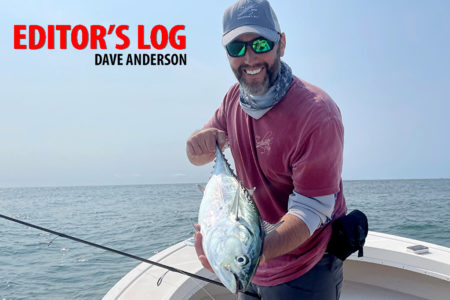Politics aside, it’s pretty clear there that climate change is a reality whether some people want to admit or not. The evidence is pretty clear and I’m not going to waste time listing the many examples and issues related to a warming climate. All you have to do is Google climate change. What is of the most interest or concern depending on your point of view is the warming of our ocean waters and how it is affecting marine life, including some of the major targets of recreational anglers. There is evidence that the migratory paths and ranges of some species are already being altered by warming ocean waters, ocean acidification and shifts in ocean currents, enough so that NOAA (National Oceanic Atmospheric Administration) takes these changes and their effects on fisheries very seriously. The following is a statement on NOAA’s website.
“Our changing climate is affecting life in the oceans, as droughts, floods, rising seas, ocean acidification, and warming oceans change the productivity of our waters and where wildlife live, spawn, and feed. Marine species tend to be highly mobile, and many are moving quickly toward the poles to stay cool as average ocean temperatures rise. These shifts can cause disruptions as predators become separated from their prey. The shifts can also cause economic disruptions if a fish population becomes less productive or moves out of range of the fishermen who catch them. As a result, fishing industries and coastal businesses face immense challenges. And there is much at risk—marine fisheries and seafood industries support more than $200 billion in economic activity and 1.83 million jobs annually. Coastal habitats also help defend coastal communities from storms and inundation, and provide the foundation for tourism and recreation-based economies in many coastal communities. For these reasons, NOAA Fisheries is committed to staying ahead of these changes and sustaining our invaluable marine resources for generations to come.”
Of more specific interest to anglers, at least in the short term because the long term affects could involve far more serious issues, are how these changes may be affecting the fish we catch. We have had southern species visiting our waters for as far back as I can remember, but the number and variety of those species appears to be on the rise in recent years. Cobia have become increasing common in recent years with numerous boat reports and at least three confirmed surf-caught cobia this summer in Long Island waters. The most impressive cobia catch occurred last week in neighboring Jersey waters where Len Andalis boated a pending New Jersey State Record 90.6 pounder while drifting a Spro Bucktail with a Slug-Go trailer. Targeting cobia has become increasingly common in Jersey waters and they have been abundant enough in New York waters some years when they were targeted here as well. In 2017, the Atlantic States Marine Fisheries Commission implemented new cobia limits for Atlantic Coastal states. In New York, there is a 37-inch size limit and two fish bag with no closed season. In New Jersey, the minimum size is 40 inches with a one fish bag limit and a season running from June 1 to September 30. Just last week, a diver working the Ponquogue Bridge speared a 20-pound cubera snapper and reported a school of big cuberas hanging around the span’s abutments. Stray black drum have popped up in reports since I was a kid but they are far more frequent. Redfish (red drum) showed up in the Long Island and Jersey surf a few years back, sheepshead are once again being targeted by a handful of savvy west end anglers, and even tarpon have been found roaming our home waters. There was the 50-pound tarpon caught under the light at Montauk several years back, and let’s not forget that sailfish caught in the Cape Cod Canal back in 2013.
The other side of the coin is, are our resident species like cod, flounder and bluefish traveling further north? Those are questions we hope NOAA will be able to provide as they continue to gather data. The next time you swear you lost the biggest striper you ever hooked, you might want to reconsider your list of options, because these days you just never know.



